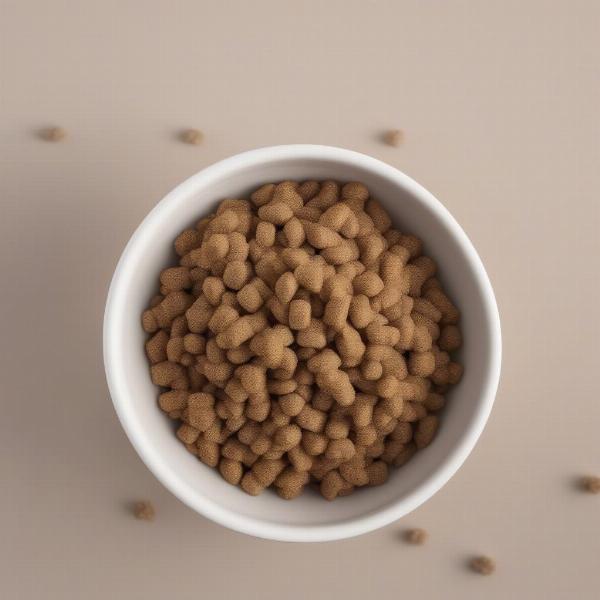Grain-free dog food has become increasingly popular, particularly for large breeds. But is it the right choice for your canine companion? This guide explores the world of grain-free large breed dog food, helping you understand its benefits, potential drawbacks, and how to choose the best option for your furry friend. We’ll cover everything from understanding ingredient lists to navigating potential sensitivities.
Decoding Grain-Free Diets for Large Breeds
Many large breed dogs thrive on grain-free diets. These formulas often rely on alternative carbohydrates like potatoes, sweet potatoes, or peas. For some dogs, this can mean fewer digestive upsets and healthier skin and coat.  Grain-free dog food formulated for a large breed dog.
Grain-free dog food formulated for a large breed dog.
However, it’s essential to remember that “grain-free” doesn’t automatically mean “better.” It’s crucial to look beyond the marketing and focus on the overall quality of the ingredients. natures domain dog food
Is Grain-Free Necessary for My Large Breed Dog?
Not all large breed dogs require a grain-free diet. Many do perfectly well on formulas that include grains like rice or barley. If your dog isn’t experiencing any digestive issues or allergies related to grains, there’s no need to switch. individually wrapped dog treats
Identifying Grain-Related Sensitivities
If you suspect your large breed dog might have a grain allergy or sensitivity, consult with your veterinarian. They can conduct tests to determine if grains are the culprit. Symptoms of grain sensitivities can include itchy skin, ear infections, vomiting, and diarrhea.
Choosing the Best Grain-Free Large Breed Dog Food
Selecting the right grain-free food can be overwhelming. Here’s what to consider:
- Ingredient Quality: Look for high-quality animal protein sources as the first few ingredients. Avoid fillers and artificial additives.
- Life Stage: Choose a formula specifically designed for your dog’s age, whether it’s a puppy, adult, or senior.
- Breed Specific Needs: Some grain-free formulas are tailored to the unique needs of specific large breeds, addressing potential health concerns.
- Budget: Grain-free foods can be more expensive than those containing grains.
“Choosing a high-quality grain-free food is about more than just avoiding grains,” says Dr. Emily Carter, DVM. “It’s about providing your dog with complete and balanced nutrition to support their overall health and well-being.”
Potential Concerns with Grain-Free Diets
While grain-free diets can be beneficial for some dogs, there have been some concerns raised about a potential link between grain-free diets and dilated cardiomyopathy (DCM) in dogs. More research is ongoing, so it’s important to discuss this with your veterinarian to make an informed decision. 12kg dog food
Transitioning to a Grain-Free Diet
If you decide to switch your large breed dog to a grain-free diet, do so gradually over several days to avoid digestive upset. Start by mixing a small amount of the new food with the old, gradually increasing the proportion of grain-free food.
“A slow transition helps your dog’s digestive system adjust to the new food,” advises Dr. Sarah Miller, DVM. “It also minimizes the risk of digestive issues like vomiting and diarrhea.” dog food 50 lb bag
Conclusion
Choosing the right food for your large breed dog is a significant decision. While grain-free diets can be a great option for some, it’s crucial to consider your dog’s individual needs and consult with your veterinarian. By focusing on high-quality ingredients and making informed choices, you can help your large breed companion thrive.
FAQ
- Do all large breeds need grain-free dog food? No, not all large breeds require a grain-free diet. Many do well on diets containing grains.
- What are the signs of a grain allergy in dogs? Common signs include itchy skin, ear infections, vomiting, and diarrhea.
- How do I switch my dog to a grain-free diet? Transition gradually over several days, mixing the new food with the old.
- Are grain-free diets more expensive? Generally, grain-free dog foods tend to be more expensive than those containing grains.
- What are some good alternatives to grains in dog food? Common alternatives include potatoes, sweet potatoes, peas, and lentils.
- Is there a link between grain-free diets and heart disease in dogs? There have been some concerns raised about a potential link between grain-free diets and dilated cardiomyopathy (DCM). Consult your veterinarian for more information.
- How can I find the best grain-free large breed dog food? Look for high-quality ingredients, consider your dog’s life stage and breed-specific needs, and consult with your veterinarian.
Related Articles
About ILM Dog
ILM Dog (ilmdog.com) is a leading international website dedicated to providing expert advice and resources on all aspects of dog care and wellbeing, specializing in breed selection, health, training, nutrition, and product recommendations. We empower dog owners worldwide with the knowledge and tools they need to provide the best possible care for their canine companions. Contact us for more information at [email protected] or +44 20-3965-8624.